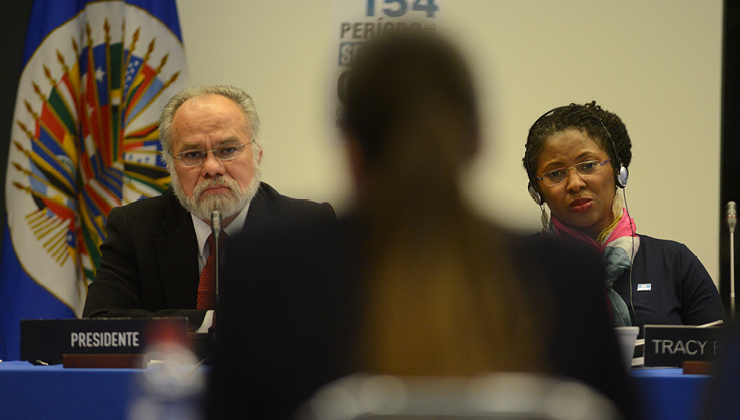This blog is also available in Spanish here.
On June 18, Women’s Link Worldwide submitted a report to the Colombian Truth Commission regarding reproductive rights violations in the context of the armed conflict. The report seeks to provide information and analysis for the Commission to clarify the practices of reproductive violence carried out by all armed actors, as well as the State’s responsibility for failing to ensure the realisation of reproductive rights of women and girls, and for the obstacles in their access to justice, truth and reparation.
The submission adds to the organisation’s efforts to achieve recognition of violations of reproductive autonomy suffered by women and girls in the context of the armed conflict before other transitional justice mechanisms created by the Peace Agreement, such as the Special Jurisdiction for Peace (JEP), and before the Constitutional Court.
Challenges and Tensions of Litigation in Reproductive Violence
Although sexual violence and reproductive violence are different conceptual categories, as litigants at Women’s Link we have found it necessary to frame violations of reproductive rights as forms of sexual violence. Contrary to what happens with reproductive violence, legal frameworks both in Colombia and at the international level recognise and broadly define sexual violence as a conduct that must be sanctioned, that can constitute a war crime or a crime against humanity, and that must be comprehensively redressed.
As part of our submission to the JEP on the first report on reproductive violence within the ranks of the FARC, we asked the tribunal to prioritise the investigation of policies and practices of reproductive control as they were generalised and systematic within the context of the armed conflict. The JEP works within the categories of international criminal law that define the acts that can constitute international crimes, which do not contain a specific category for reproductive violence or gender-based violence, while privileging an approach based on sexual violence.
However, they do allow the framing of reproductive violence, such as forced abortion and forced contraception, as “any other form of sexual violence of comparable gravity” (Art. 7 (1) (g) and Art. 8 (2) (e) (vi) of the Rome Statute). Some authors have already begun discussing different options that the Rome Statute could offer to judge acts of reproductive violence.
Likewise, we litigated the case of Helena before the Constitutional Court. Helena is a woman who was recruited by the FARC as a child, forced to take contraceptives and have an abortion. She has had no access to reparation measures because she left the armed group after she turned 18 years old.
In December 2019, the Court issued a landmark decision recognising that violations of reproductive rights such as forced use of contraceptives and forced abortion, even if they are intra-force, constitute serious human rights violations and war crimes, and ordered relevant institutions in Colombia to ensure Helena’s access to comprehensive reparation measures. In the proceedings we defined the events suffered by Helena as forms of sexual violence because the Victims’ Unit —the institution in charge of administering reparations to victims of the conflict in Colombia — does not include a category of victimising events related to reproductive violence.
The decision of the Colombian Constitutional Court constitutes another legal advance in the recognition of violence faced by women, girls and adolescents within armed groups. In this regard, in the case of Bosco Ntaganda the International Criminal Court recognised for the first time in international criminal law that acts of sexual and gender-based violence, as proscribed by article 8.2 (e)(vi) of the Rome Statute, are prohibited at all times and against any person, including acts of violence against women and girls of the same armed force.
What follows? Should reproductive violence be an independent category of analysis in armed conflict?
Advances in legal standards on gender-based violence within armed groups and on reproductive violence with the case of Bosco Ntaganda at the ICC and the Constitutional Court’s SU-599-19 , make us wonder whether reproductive violence should be analysed as a form of sexual violence. Or should reproductive violence be an independent category of analysis and be defined as such in law and jurisprudence?
To date, not much attention has been devoted to the question of whether all acts of reproductive violence meet the element of sexual nature required by the international crimes of sexual violence so far recognised. Hence, future cases could address whether this characteristic is met or go beyond it, towards the creation and consolidation of the category of reproductive violence as an independent concept for analysis.
The decision of the Colombian Constitutional Court constitutes another legal advance in the recognition of violence faced by women, girls and adolescents within armed groups
As feminist lawyers and legal representatives of women victims of reproductive violence, we ask ourselves, what are the drawbacks for victims if reproductive violence is not analysed as an independent category that allows specific reparations? What are the drawbacks in terms of truth and guarantees of non-repetition in the context of transitions if reproductive violence is not named as such and if its historical and structural causes are not analysed as a phenomenon that deserves independent analysis?
The importance of analysing reproductive violence in armed conflict
Reproductive violence occurs in different ways in contexts of armed conflict, but it has been an under-analysed type of violence despite its prevalence. In some cases, reproductive violence can be linked to sexual violence, but in others it cannot and should therefore be analysed independently because of the specific damage it entails, because it can include the violation of other human rights and because it names a specific phenomenon: acts that affect reproductive capacity or reproductive autonomy.
As feminist lawyers, we are faced with the difficulty, again, of addressing violence that has a disproportionate effect on women and that is not so widely developed conceptually and legally. Hence the importance of addressing it. In the coming years we will see legal developments on reproductive violence in the final report of the Truth Commission and in the rulings of the JEP in Colombia.
Reproductive violence continues to be insufficiently addressed in transitional justice mechanisms around the world, but we hope this changes in the coming years, particularly because victims continue to be at risk of reproductive violence and deserve justice, reparation and non-repetition measures.
The views, thoughts and opinions expressed in this blog post are those of the author(s) only, and do not necessarily reflect LSE’s or those of the LSE Centre for Women, Peace and Security.
Image credit: Laura Martínez Valero, Women’s Link Worldwide





